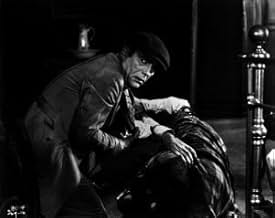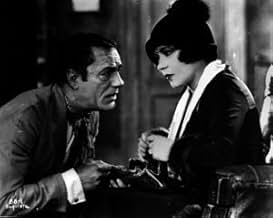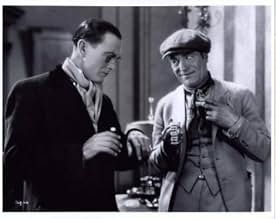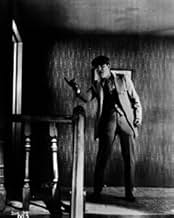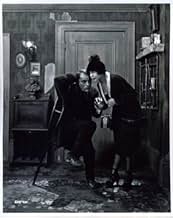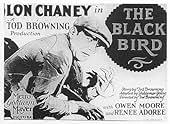PUNTUACIÓN EN IMDb
6,7/10
963
TU PUNTUACIÓN
Añade un argumento en tu idiomaTwo thieves, the Blackbird and West End Bertie, fall in love with the same girl, a French nightclub performer named Fifi. Each man tries to outdo the other to win her heart.Two thieves, the Blackbird and West End Bertie, fall in love with the same girl, a French nightclub performer named Fifi. Each man tries to outdo the other to win her heart.Two thieves, the Blackbird and West End Bertie, fall in love with the same girl, a French nightclub performer named Fifi. Each man tries to outdo the other to win her heart.
- Dirección
- Guión
- Reparto principal
- Premios
- 1 premio en total
Andy MacLennan
- The Shadow
- (as Andy Maclennan)
Charles Avery
- Music Hall Patron
- (sin acreditar)
Lionel Belmore
- Music Hall Proprietor
- (sin acreditar)
Margaret Bert
- Minor Role
- (sin acreditar)
Peggy Best
- Minor Role
- (sin acreditar)
Louise Emmons
- Old Lady at Mission
- (sin acreditar)
Willie Fung
- Chinese Man
- (sin acreditar)
Fred Gamble
- Man Saying There's a Present for Fifi
- (sin acreditar)
Joseph Hazelton
- Man at Table in Music Hall
- (sin acreditar)
Cecil Holland
- Old Man at Mission
- (sin acreditar)
Bertram Johns
- Member of Bertie's Slumming Party
- (sin acreditar)
Reseñas destacadas
By contrast, I was relatively satisfied with THE BLACK BIRD. The plot is somewhat derivative (particularly of THE PENALTY [1920]), but Chaney is in fine form here. The film goes a long way in simulating the Limehouse atmosphere, even where dialogue is concerned (which comes off as fairly hilarious if quite endearing).
The romantic leads, as played by Owen Moore and Renee' Adoree', are above average in this case; in fact, Moore (as a gentleman crook) is more of an anti-hero here and creates an interesting contrast to Chaney, who himself alternates between the villainous 'Black Bird' and the saintly 'Bishop' throughout.
For a Browning/Chaney effort, the film is fairly conventional and comes off as somewhat protracted (particularly the overly contrived ending) when compared to THE UNKNOWN (1927). Chaney's (deceptive) physical deformity of his 'Bishop' character is the sole weird element in evidence and, for once, here we get a chance to observe - on camera - the way Chaney accomplishes this amazing feat!
The romantic leads, as played by Owen Moore and Renee' Adoree', are above average in this case; in fact, Moore (as a gentleman crook) is more of an anti-hero here and creates an interesting contrast to Chaney, who himself alternates between the villainous 'Black Bird' and the saintly 'Bishop' throughout.
For a Browning/Chaney effort, the film is fairly conventional and comes off as somewhat protracted (particularly the overly contrived ending) when compared to THE UNKNOWN (1927). Chaney's (deceptive) physical deformity of his 'Bishop' character is the sole weird element in evidence and, for once, here we get a chance to observe - on camera - the way Chaney accomplishes this amazing feat!
Doctor Jekyll and Mister Hyde in a bad quarter of London : Lon Chaney plays a double role in the film and in the story, a robber (the Raven) and a man who carries about poor people (the Bishop). The way of acting is remarkable because it's a silent movie. The great thing is that the Bishop is half-paralyzed so Lon Chaney has to play the contorsionist when he moves from Raven into Bishop. The strange atmosphere is very well described with threatening faces and slumhouses.
If it weren't for the acting technique of LON CHANEY, here deceiving others by assuming a dual role, THE BLACKBIRD would be a lot less interesting to discuss. The plot at first promises to be intriguing, but soon becomes bogged down in a story of petty jealousy between two crooked men for the affections of a pretty girl.
OWEN MOORE is the aristocratic looking gentleman thief in love with RENEE ADOREE, as is Chaney. One of the film's saving graces are the close-ups of Chaney glowering at Moore when he realizes he's winning the heart of the girl that both of them love. Chaney uses all of his facial mannerisms in a way that makes the screen titles almost unnecessary since he tells everything with his eyes and his body movements.
But the thin plot is the culprit here. Many scenes drag on too long without sufficient reason to and the plot is ultimately a weak one by any standards. Todd Browning does get a terrific performance from Chaney, though, and that's the chief reason for watching in the first place.
The tawdry atmosphere of the Limehouse London scenes is effective but the story's ending is a weakness.
Summing up: Highly watchable for Chaney alone.
OWEN MOORE is the aristocratic looking gentleman thief in love with RENEE ADOREE, as is Chaney. One of the film's saving graces are the close-ups of Chaney glowering at Moore when he realizes he's winning the heart of the girl that both of them love. Chaney uses all of his facial mannerisms in a way that makes the screen titles almost unnecessary since he tells everything with his eyes and his body movements.
But the thin plot is the culprit here. Many scenes drag on too long without sufficient reason to and the plot is ultimately a weak one by any standards. Todd Browning does get a terrific performance from Chaney, though, and that's the chief reason for watching in the first place.
The tawdry atmosphere of the Limehouse London scenes is effective but the story's ending is a weakness.
Summing up: Highly watchable for Chaney alone.
Lon Chaney gets to play his own evil twin in this Tod Browning crime adventure. The "Blackbird" is a low-life criminal who falls in love with Fifi, a music hall performer. Unfortunately, someone else loves her too: posh "West End Bertie," who wears a topper and a monocle like Bertie Wooster, but who's actually a crook himself, not above robbing his own friends while they're out slumming (including watching "chinkys" smoking opium).
The Blackbird and Bertie decide to become a team, but tension mounts as the Blackbird realizes that Fifi is falling for Bertie. Mixed in to the plot is the Blackbird's ex, who seems on a crusade to reform him, and his brother 'The Bishop', a helpless cripple known for his work among the poor. Blackbird and Bishop share a room but are never seen together.
The ending is tragic, as could be expected, but not without a trace of "cornball."
Browning's direction is excellent. He sets up the Limehouse location at the opening by showing a sequence of faces that evoke the atmosphere more than a mere set could do. He knew how to get the best out of Chaney, but the others in the cast also do a fine job with their facial expressions, all masterfully captured by Browning. The new score by Robert Israel, containing snippets from Chopin and others, fits the period well and never intrudes.
The Blackbird and Bertie decide to become a team, but tension mounts as the Blackbird realizes that Fifi is falling for Bertie. Mixed in to the plot is the Blackbird's ex, who seems on a crusade to reform him, and his brother 'The Bishop', a helpless cripple known for his work among the poor. Blackbird and Bishop share a room but are never seen together.
The ending is tragic, as could be expected, but not without a trace of "cornball."
Browning's direction is excellent. He sets up the Limehouse location at the opening by showing a sequence of faces that evoke the atmosphere more than a mere set could do. He knew how to get the best out of Chaney, but the others in the cast also do a fine job with their facial expressions, all masterfully captured by Browning. The new score by Robert Israel, containing snippets from Chopin and others, fits the period well and never intrudes.
Perhaps, one of the lesser known collaborations between Lon Chaney Sr. and director Tod Browning--"The BlackBird" has all the conventional trappings of a Chaney/Browning film; or any Chaney Sr. film now that I think about it. One of those trappings being the "love triangle" as it seems that Chaney spends a fair amount of time pining for a woman who ends up falling in love with another man.
This film also has Lon playing a double role--no elaborate makeups to disguise himself with--just the master craftsman contorting his body to play the part of the crippled "Bishop", and his nefarious brother "The Blackbird." Apparently, the Blackbird needed a cover to help hide his criminal activities and thus the part of the Bishop comes into play.
"The Blackbird" starts off a bit slow, as we the audience are introduced to all the principal characters, but picks up steam towards the end. Overall, I can see why this movie is not one of the more well-known Chaney/Browning collaborations--not that I'm saying it's bad, far from it. It's a good movie & if you're a fan of Chaney Sr. then you will definitely add this one to your collection. Now, if someone could only find a surviving print of "London After Midnight."
7 stars
This film also has Lon playing a double role--no elaborate makeups to disguise himself with--just the master craftsman contorting his body to play the part of the crippled "Bishop", and his nefarious brother "The Blackbird." Apparently, the Blackbird needed a cover to help hide his criminal activities and thus the part of the Bishop comes into play.
"The Blackbird" starts off a bit slow, as we the audience are introduced to all the principal characters, but picks up steam towards the end. Overall, I can see why this movie is not one of the more well-known Chaney/Browning collaborations--not that I'm saying it's bad, far from it. It's a good movie & if you're a fan of Chaney Sr. then you will definitely add this one to your collection. Now, if someone could only find a surviving print of "London After Midnight."
7 stars
¿Sabías que...?
- CuriosidadesThe Blackbird (Lon Chaney) was called The Mocking Bird in earlier versions of the film.
- Citas
Woman with Diamond Choker: I say... we are going down Plum Alley to see the Chinkies smoking.
West End Bertie: I say... shall we go?
- ConexionesFeatured in MGM: When the Lion Roars (1992)
Selecciones populares
Inicia sesión para calificar y añadir a tu lista para recibir recomendaciones personalizadas
Detalles
Taquilla
- Presupuesto
- 166.000 US$ (estimación)
- Duración1 hora 26 minutos
- Color
- Mezcla de sonido
- Relación de aspecto
- 1.33 : 1
Contribuir a esta página
Sugerir un cambio o añadir el contenido que falta

Principal laguna de datos
By what name was Maldad encubierta (1926) officially released in India in English?
Responde

